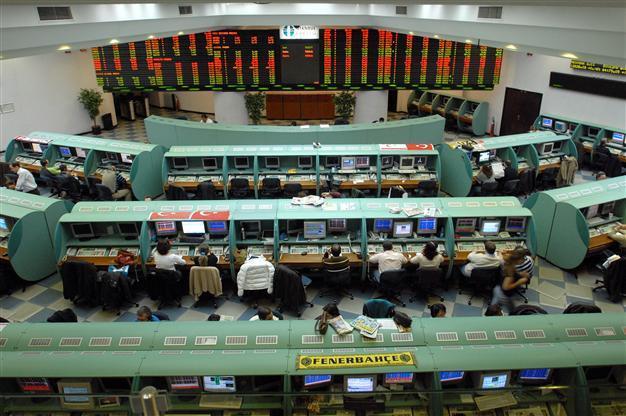Probe into brokerages may ‘unsettle investors’
ISTANBUL-Reuters

The market volatility also coincided with three weeks of anti-government protests during which Prime Minister Tayyip Erdoğan repeatedly accused market speculators of seeking to destabilise the Turkish economy. Hürriyet photo
Turkey’s Capital Markets Board (SPK) has open a detailed investigation into financial orders at brokerages, with a focus on foreign transactions between May 20 and June 19, when Turkey’s main stock exchange, Borsa Istanbul, fell by nearly 20 percent, but this move has a risk of “unsettling investors.”In a confidential document seen by Reuters June 25, the regulator requested information on brokerages’ personnel, copies of research reports, logs of communications with customers and more for the period of May 20 to June 19 in what sources close to the matter described as unprecedented in scope.
“This is a decision for a limited probe in connection with the period of high volatility in the market that began with the Federal Reserve’s statement,” the official told Reuters. “If you look at the date, you can see that it coincides with May 20, when the Fed began its statements.” Fed Chairman Ben Bernanke said May 22 that the U.S. central bank could slow down its bond buying, and on June 19 he said tapering of the program could come by year-end. The market volatility also coincided with three weeks of antigovernment protests during which Prime Minister Erdoğan repeatedly accused market speculators, which he called the “interest rate lobby” of seeking to destabilize the Turkish economy.
However, an economics journalist at daily Radikal, Uğur Gürses, said in a telephone interview with the Hürriyet Daily News yesterday that the date included also a period in which the investors started to think that Japan’s monetary policy would fail and Japan’s bourse was falling. “The bourse might be affected by the Gezi Park protests, which began on May 31, and the government’s mishandling of the incidents, but mainly the Fed’s decisions and Japan’s economy,” he said. Gürses said as the foreign investors remained around 65 percent of the stock of the bourse, high-volume sales could happen in such an atmosphere. “Investors who float shares by regarding profit and loss will be unsettled when their transactions are probed,” he said, adding that this investigation would damage Turkey’s financial markets.
The SPK head Ertaş said 2 percent of the transaction volume was “suspicious” during an interview at private broadcaster Bloomberg HT yesterday. Ertaş said their goal was to provide a good basis for investors “who do transactions correctly” and they should not be worried. He added that the investigation was limited to stocks.
However, Gürses said the documents requested by the SPK from brokerages to examine showed that the institution didn’t have a concrete proof to launch an investigation. “The transaction volume can be volatile and have a high volume in this period. But creating a conspiracy will damage the markets.”
“Even if the Gezi Park protests had never taken place, massive sales would have happened. After the Fed’s and Japan’s effects, the capital outflow had already begun. On May 13, $2.8 billion flowed from the Turkish Central Bank,” he said.
End to speculations
Meanwhile, Attila Köksal, head of the Association of Capital Market Intermediaries Institutions, said this investigation had been launched to put an end to the speculations about the possible reasons of the recent volatility in the markets, in an interview via e-mail with the Daily News yesterday. “If there is a problem, it will be revealed and measures will be taken. If there is not, it will be announced,” Köksal said.
Ertaş said they needed to make a distinction between the corporations and the staff before taking criminal action.
If the brokerage makes a mistake, the investigation will cover it, but if it is a personal mistake it should be separated from the corporate body.
The SPK notice read, “A need has arisen for information in the form of telephone records, written instructions, orders sent over the Internet and all chat logs related to the instructions sent to your institution by foreign clients between May 20 and June 19 [and] information on how orders from your foreign customers were received and how and through which channels these orders were delivered to the bourse.”
















